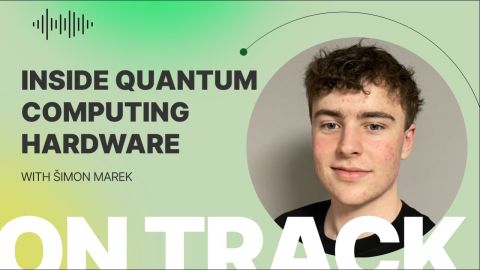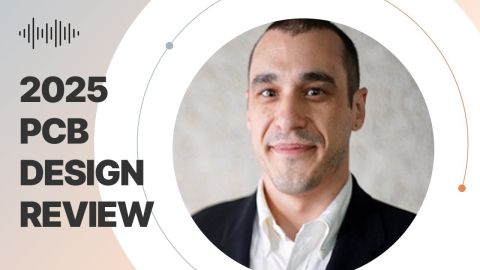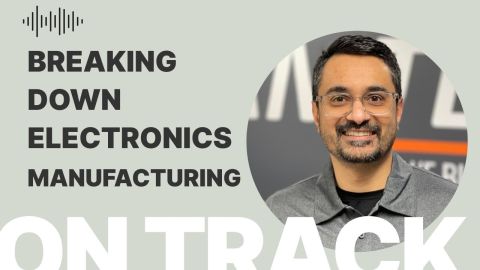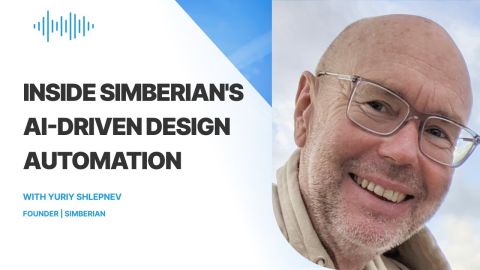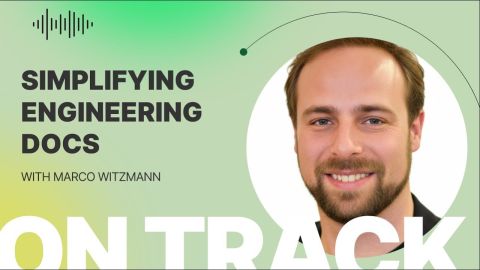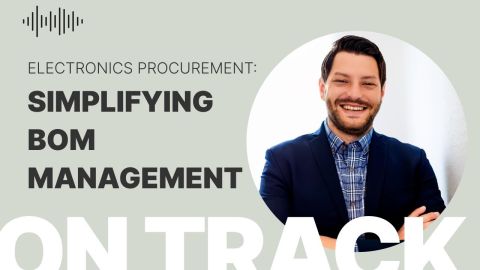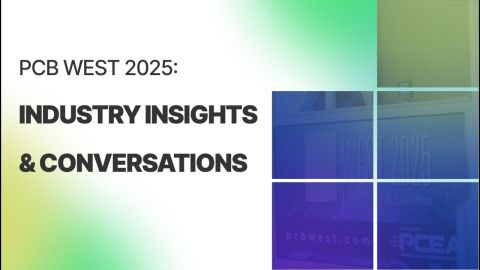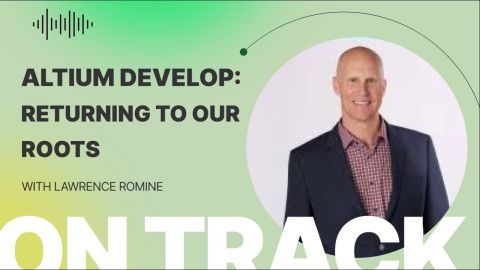IPC Standards for Electronics Sustainability

Sustainability in electronics encompasses environmental, social, and corporate governance aspects, and IPC aims to make it easier for companies by providing standards, education, and advocacy to navigate these complex issues.
In this episode, we are very pleased to have Kelly Scanlon of IPC to enlighten us about the importance of sustainability in the electronics industry and how you can contribute as a PCB designer.
Listen to this Podcast:
Watch this episode:
Show Highlights:
- Introduction to Kelly Scanlon, the Lead Sustainability Strategist at IPC
- Kelly talks about her role at IPC and her background before landing her current position
- Kelly explains that sustainability covers environmental, social, and corporate governance
- The European Union (EU) has been leaders in producing policies that have real opportunities for environmental change, in the space of sustainability
- What are the ways can companies prove their compliance to sustainability?
- Environmental sustainability in the electronics industry has well-defined processes and regulations, like the RoHS (Restriction of Hazardous Substances in Electrical and Electronic Equipment) and REACH (Registration, Evaluation, Authorisation and Restriction of Chemicals) making it easier to manage and communicate compliance
- Social sustainability poses greater challenges as there is no clear process and requires multidimensional teams to address issues like worker health, labor practices, and corporate governance
- Vendor checklists and assessments are used to vet suppliers, but there is a need for increased transparency and honesty in supply chains
- Companies rely on policies and regulations to ensure compliance throughout the supply chain and are pushing for accountability and reliability from their suppliers
- Kelly Scanlon emphasizes the need for a strong community and collaboration to address environmental, social, and governance sustainability in the electronics industry.
- Designers play a crucial role in driving sustainable practices by incorporating conscientious and intentional lifecycle management in their design decisions, and by advocating to manufacturers to prioritize sustainability
- Designers can make their voices heard by reaching out to IPC and participating in workshops, case studies, and events focused on sustainability
- IPC formed its Sustainability for Electronics Leadership Council, a team with diverse geographic background and diverse supply chain background that come together sharing their insights and expertise
- Designers and manufacturers are encouraged to connect with Kelly, ask questions, contribute your expertise, and to actively advocate sustainability efforts in the electronics industry
Link and Resources:
- Read related articles:
- Watch related OnTrack podcast episodes:
- Connect with Kelly Scanlon on LinkedIn
- Follow IPC Sustainability for Electronics LinkedIn Page
Kelly Scanlon:
What the heck is sustainability for electronics? At IPC, we are working to figure that out in a way that again, will make sense for the industry. Then we provide those standards, education, advocacy, et cetera to help them. Easy button, yes, that's what we aim for.
Zach Peterson:
Hello everyone and welcome to the Altium OnTrack podcast. I'm your host, Zach Peterson. Today we're talking with Kelly Scanlon, lead sustainability strategist at IPC. Sustainability is a topic that has been front and center in the news quite often over the past few years, especially relating to supply chain and of course the environment. Kelly leads efforts at IPC to integrate this into standards and other issues affecting the industry. Kelly, thank you so much for joining us.
Kelly Scanlon:
Thanks, Zach. It's great to be here.
Zach Peterson:
Yes, thank you so much for responding to my request. I saw that you had appeared in I-Connect007, and I thought it would be great to talk about this topic because it does come up from time to time in various contexts. If you could, maybe tell us your background and then what did the exactly it is you do at IPC as a lead sustainability strategist?
Kelly Scanlon:
Yeah, so let me actually start with the lead sustainability strategist part. It's kind of a fun title. My role at IPC is cross-functional. We are a trade association and we have companies around the world that subscribe and become members to IPC because we are a standards development organization. We do education, workforce training, advocacy. We're a source of industry intelligence, a source of events. I, as the lead sustainability strategist, get to really work across those various functions at IPC to make sure that we are doing what we can to integrate sustainability topics into those offerings. I get to work across the board to figure out what we can do to make relevant electronics sustainability for electronics topics more tangible, more, provide more resources for the industry. I am able to do that because I care a lot about our industry and a lot about sustainability.
Also, I happen to have a real academic background in this. I have studied environmental health, occupational or worker health and sustainability sciences. My doctoral research actually looked at lifecycle assessment. It's a tool for evaluating impacts to human health in the environment, across the product's lifecycle, whatever that may be, including electronics. I was building into lifecycle models, data and additional ways to look at actually worker health. What I do is I look at big problems. I try to take a comprehensive view of those and find all the interconnectedness of all those different factors within those big problems, and then funnel that or otherwise manage that in a way that it becomes more practical and more realistic and more tangible so that we have within our grasp a solution. That's how I work and what I do, what my background is. Now at IPC, that's what I'm doing too. It's really building on an infrastructure of standards and education and advocacy, et cetera, to integrate sustainability.
Zach Peterson:
If I could attempt to summarize, it sounds like part of your goal in what you do is to make sustainability easy for companies in the electronics industry, whether that is environmental or in some other aspect of sustainability. Is that a fair description?
Kelly Scanlon:
I think that's right. If we have the proverbial easy button, we want to press that. We want to build that button and we want to press that button. The thing is that it's not easy, and that's the joy of this, although it's the stressor at the same time. When we say sustainability, what does that mean? Is it environmental? Well, no, actually it's environmental, it's social, it's corporate governance. Not everything's easily categorizable into those three buckets, but in general, that's what we do. Sustainability is big, unwieldy. The other part of that is you know what, so is electronics. It's big and unwieldy. It's complicated. What the heck is sustainability for electronics? At IPC, we are working to figure that out in a way that again, will make sense for the industry. Then we provide those standards, education, advocacy, et cetera, to help them. So easy button, yes, that's what we aim for.
Zach Peterson:
Certainly. Now, I've mentioned environmental a couple of times. You mentioned it, and I think when people hear the word sustainability first they probably do cue into the environmental side of it, but then I think for folks in the electronics industry, they default to REACH and RoHS, and then if they're paying attention to some of the newer issues that have come up in the past few years, it's on PFAS, sorry, P-F-A-S. Those forever chemicals that persist throughout the environment. There is legislation and guidelines throughout the industry and directives overseas in Europe that are trying to address all of that. What's the interplay between what IPC does and then what the broader set of environmental regulations try to address?
Kelly Scanlon:
Yeah, there's a lot of overlap. Let me take it from this direction and then you re-steer me. We can say that on our planet Earth, the European Union has really been leaders in thinking through and actually producing policies that have real opportunities for change in this space of environment, in this space of sustainability. Those are big drivers because those policies will affect any company in the EU and then also any company within the value chain of those EU companies. It has these tentacles that reach out far and wide. You have those big policy drivers, those policy drivers though in the EU and then elsewhere it's not unique to the EU, but let's just stay with them for now; those are not just environmental, it is social and it is corporate governance.
There's a really important policy that's moving through the European Parliament, European Council, European Commission right now, Corporate Sustainability Due Diligence Directive. That would obligate certain companies in due time, probably a whole lot of companies, but there'd be a tiered implementation depending on size, revenue, a few things, a few factors. The point is that it's obligating those corporations to look at human rights and environmental due diligence and to be aware of not only what they're doing but what others in their value chain are doing. That, again, has really far-reaching power to really affect change. One thing that we noticed is that it's not just a business model change, it's a behavioral change. When we think of environmental, social, corporate governance, so corporate governance, some examples maybe might be helpful like ethics, product assurance, security issues. Really those anti-corruption type issues that really are almost the bottom line bread and butter of any company, you need to do those things no matter what. Social sustainability, what does that include? Well, that can be diversity and equal opportunity worker health and safety, labor practices and child labor or forced labor issues.
Then you've got your environmental issues, which I do think that many of us are more innately attuned with. Environmental touches a lot of things. It can be energy, water, waste management, chemicals management, and then the resulting emissions from those, so waste emissions, greenhouse gas emissions, and how you actually account for those things. It's really quite diverse. When we start talking about sustainability for electronics, is it all of those things? Is it some of those things? Is it something else that is yet to be named? That's part of what we're working on.
Zach Peterson:
When I hear due diligence, especially surrounding corporate governance, that makes me think that there's an element of auditing involved, and there is certainly a role for companies to maybe demand certain certifications or proof of compliance with certain regulations. I know typically there are things like conflict mineral statements, there are other sorts of statements that companies make to try and prove and demonstrate that they are compliant with these goals and issues. What other ways can companies go about ensuring that their supply chain, whether it's lower level vendors or the people who are going to use their products, are sustainable?
Kelly Scanlon:
Yeah, that's a great question because I don't know the answer. How can companies do-
Zach Peterson:
That's your job to help figure it out.
Kelly Scanlon:
Yeah, absolutely. There's a few things. If we have no policymakers anywhere in the world and no regulations anywhere in the world and there's no need to comply because you're going to get in trouble with the regulator, well, I think we'd still have our own policing that goes on, which is what's happening already. We see that stakeholders really, really put pressure on companies to do things. How do you keep the regulators happy and your stakeholders, meaning your own employees, your community, where your facility operates, your shareholders, and investors; how do you satisfy all of them? Well, one is of course if there are specific requirements like a CE mark for Ross or some other required disclosure, you would need to do that.
The other is, again, getting at what is turning into soon will be more stated requirements, but in the meantime are very strong best practices around sustainability reporting. Companies take on the obligation to be more transparent with all of their stakeholders by producing reports. These reports can address specific disclosure requirements and also go beyond to really address how they determine what is relevant in the space of sustainability for their company or the products they make. What are the obligations that they promise, for example, targets to achieve net-zero or reductions in their greenhouse gas emissions. There's a movement to have more just honesty and transparency in what you're doing.
That then leads to, I think, a bigger problem, which is, well, are people telling the truth? What is truth when you don't necessarily have benchmarks to measure it against or to hold yourself against to say, "This is what's real and not real." You have issues, golly, it's tough because every company may do it a little bit differently. If you're a multinational company, you have different regulatory obligations depending on where you operate so that might look different depending on where you are. How do you do the same thing no matter where you are, whether it's in Asia versus Europe versus Mexico? How do you that? I feel like I'm meandering a bit here, but I think the point is that it's a bit messy.
Going back to the easy button metaphor or example, how can we standardize and harmonize what is most relevant in this space of sustainability for the electronics manufacturing value chain? How then do we provide tools and data that allow a more comparable analysis in reporting, whether that is required by law or required by your stakeholders or something that you as a business just decide is the right thing to do. Again, we're shifting from right thing to do and it makes you feel good to you got to do it. Somewhere on that spectrum you're being driven to do more.
Zach Peterson:
Sure. I think regarding the easy button, it's much easier to create an easy button with environmental stuff because you set a limit on chemicals, either you're above it or below it, and that determines compliance. Then you specify who's responsible for testing and proving it. I think we've done a pretty good job with RoHS and REACH, but when you start getting into these elements of social and you start getting into these elements of some of these stickier, I guess not stickier, but messier issues, maybe child labor or conflict minerals or things like that, that seems like something that's very difficult to penetrate and test for. If I'm a manufacturer and I'm sourcing materials from somewhere overseas, of course I want to make sure that it is sourced sustainably and it doesn't have undue negative social impact. How do I go about verifying that? Do I travel to the suppliers' facilities and make sure that they're doing everything correctly?
Kelly Scanlon:
Indeed, some companies are doing that, right, where they will do supplier checklists, they'll do supplier assessments, and they actually can claim that they're doing these assessments so it is more likely that they have a real answer as to who exactly is in their value chain, who are those workers, where are they? It's true, our value chains are really complicated. At any point you might be using rare earth elements. Well, where are those coming from? Can you even get to those facilities? It's not foolproof at all. There's no absolute way.
There's a lot of directions to go here. One would be, so if you're the regulator, how do you enforce compliance? Then if you're the company, how do you figure this out? If you're trying to be competitive and all of you do not want to have child labor or forced labor in your value chain, how do you work together maybe, or how do you figure that out together to make sure that you don't have an unfair advantage for the one company who might not care and goes forward? I mean, there's a lot there.
I think what I want to say though is that I would agree with you that the environmental sustainability topics are something, again, more just something we've been dealing with longer and have some really now decades old laws around. Even if those laws begin to evolve and shape themselves to be more conscious of circularity and circular economy, like the Ross directive is evolving, the REACH regulation is evolving to be conscious of these things and to maybe change to be more inclusive of circularity.
The truth is, we've had those with us in our pockets for a while. Even if you throw into the mix a new thing like PFAS, per- and polyfluoroalkyl substances, wow, that's a whole nother podcast, because there's thousands of them and we are not quite sure where they're all used because they have tremendous functionality, chemical and physical properties that really make them quite useful in a lot of applications. The cases though that the way we evaluate and think about chemicals is still the same. PFAS are looking to be regulated under the REACH regulation, and it would be a restriction activity. It's a similar mechanism for managing them, even though they're still new to our lingo and new to our consciousness.
The other part of that is that indeed, many of the people who are doing sustainability that I've worked with, so I don't know that this is universal, but I've worked with outside of electronics and now in electronics industry, came up through the Environmental Health and Safety Department. That's me. I'm an environmental health and safety person. I'm an industrial hygienist. I do worker health and safety. I went the direction of learning more about sustainability and sustainability sciences. Yet here I am, the lead sustainability strategist. Every now and again, you'll get an engineer mixed in, but they too, were probably an environmental engineer or chemical engineer, and so that's great, but they speak that same lingo.
What we're seeing is this need for increased awareness about the other dimensions of environmental and then all these other sustainability buckets, these other sustainability things, because there is this interconnectedness of them, the social and the corporate governance pillars of sustainability. That means that if you're an environmental health person, you might not be best equipped to deal with these other things, these other sustainability pillars and so who is? We're seeing more than ever the need for these multifunctional, multidimensional teams that you do have your human resources person, your legal person, your financial person people. You need teams that understand how those different issues manifest or how those different topics are manifesting or being managed within your company within at a specific facility or even benchmarking against others in your supply chain segment. I think the bottom line of this podcast is, wow, it's a lot. Yet we're again trying to make sense of all of it because it is possible to make sense of it, but it's big. It's big.
Zach Peterson:
Yeah. What I'm hearing here is that at least on the environmental side, because it's been going on for so long, there are processes in place that make it easy. That's the easy button is there's a well-defined process. It's proliferated throughout the industry. There are enough people that have experience doing it that you can hire someone, they can set up a program and they can ensure compliance and then accurately communicate content of any hazardous substances to both customers, as well as any vendors or whatever requirements they need their vendors to meet. Because of the evolving and maybe not so well-defined issue of social sustainability, it's a bit more difficult to define what exactly the process is. I think also some of the suppliers who you might be trying to vet for their level of sustainability, I think there's another issue of just honesty.
It seems to me that essentially you're pushing off the liability onto somebody else by doing these vendor checklists. As long as the vendor just puts up the window dressing while you're there in the factory, you can say, truthfully, "Well, we went there and we looked and everything looked on the up and up." Then lo and behold, they're doing something that they shouldn't be doing, especially within the bounds of social sustainability.
Kelly Scanlon:
Yeah. I would like to say that my experience not only with the electronics manufacturers that are affiliated with IPC, whether they're members or not, and then even before that, the other places where I've worked, including Department of Defense, there's actually a whole lot of people, a whole lot of companies that are doing the "right thing". We know that the right thing evolves over time. We get new up updated ways of thinking of things. Know that that's not a great statement. The right thing is right for that moment, but indeed, they've been trying to do the right thing and are doing the right thing, but still we know that there are issues. Weeding those out and putting a lens on those is really important.
Right now we're really relying on policies to force activities that make you really check those boxes and double check those boxes to make sure that those are the right things, but that the right things are happening. If it wasn't a problem, then we wouldn't be talking about it. On the balance, I think most are doing what they can and don't want any non-compliance and want products that.
Zach Peterson:
Yeah, that's understandable. I think at some point though, as you push the responsibility for compliance farther up your supply chain, at some point you have to rely on where you source from and you need to source from jurisdictions that have those regulatory policies in place that then require all of your suppliers to also be compliant. If you're sourcing from somewhere that doesn't have those regulations in place, then at some point you may run into a dishonest supplier because there's nothing there forcing them to be honest.
Kelly Scanlon:
That's right. Yeah. That's again, the movement is to do that, to hold more accountable. This is also part of the challenge of when you think about even just the electronics value chain, if we just loosely say the OEM is the ultimate customer, even though we know the user is really the customer, but that you're building electronics against specifications or requirements, contract obligations to what is needed at the end of the chain. As these policies evolve and as these peer pressure evolves, those OEMs are wanting more clarity and proof that what the suppliers are giving to them is accurate and reliable.
That's where, again, this is part of our job at IPC, we already do standards. Can we be doing more to standardize the types of information that are necessary to demonstrate that and to then move that information through that complicated supply chain with reliability so that you have more accurate data moving more reliably through a supply chain, and that we are able to guard the information from those who do not need to see it and provide access to those who do need to see it such that you can fulfill obligations to, whether it's contract obligations or just peer obligations to be more transparent?
Then also, this makes everything so much more efficient. How do we leverage those efficiencies to build electronics better and actually use those data to say, "Wait, whoa, what are we doing? What is the energy input needed here? What are the waste impacts? Where does my waste product go? Is recycling an option? What else can I be doing?" I think this is just an opportunity. What you're getting at Zach is, well, this is hard, and this is people are going to lie, cheat and steal possibly. Well, it's really an opportunity to standardize, harmonize, and get better data that we can move more reliably so that we do, we solve some real problems.
Zach Peterson:
That gets us closer to that easy button that we already have with the environmental side.
Kelly Scanlon:
Yeah.
Zach Peterson:
One question I have is, in terms of the work that you do, are you working closer with manufacturers or do you interface with designers? The reason I ask that is because at some point, a designer is the one that creates the product that's going to get manufactured, and it's their input that creates this specification that the manufacturer has to follow. Given that that's the case, what do product designers and PCB designers have to do to ensure that they are meeting sustainability goals that I think we all agree are important and the right thing to do?
Kelly Scanlon:
There's two things you're getting at there. One is we're just leap right ahead to, "Designers, fix this. Call the designers, shout out, wake up, do something." Yes. Before that, my job and what IPC does, I will talk to everybody and anybody in the value chain. I want as much information as possible. We need a stronger community of sustainability for electronics. I am excited to be building that community. Today I'm glad to be talking to you to say we need this community and the listeners to this podcast can be part of that community. It can be more formal, but right now it's rather informal. We just want people talking about this and coming forward with ideas of how to address environmental social governance, sustainability issues for the value chain based on what is most pressing and relevant because not everything's relevant to electronics, but what is most pressing and relevant that we can do that.
Indeed, design for blank line is the answer, design for environment, design for circularity, design for recyclability, design for remanufacturability, design for energy, design, design, design. How can we design for excellence and make it such that we have some sort of continual improvement process that, this is asking for a lot here, but that we don't design something and then build it that way forevermore, but that we build in some sort of flexibility as to what we design and how we make it, knowing that there are not only product life cycles, but there's a product design life cycle. It takes time to design it and get it into the shape where it's actually in my hand to be used or in the hand of the aerospace and defense industry, whatever it may be.
I do see that designers are the key here to really making substantial change. I believe that there needs to be, and if I can, I would say, how do we define sustainability for electronics right now? I shy away from defining it because it isn't really definable, but I have three tenants of how do you build electronics meaning, better being sustainably; so conscientious and intentional lifecycle management. That's for the processes as well as the products. Attention to information that can increase resource efficiency and decrease impacts and awareness of concepts, approaches, and metrics that allow you to make better decisions, but not just at any one moment in time, but continuously so continuous improvement.
Designers are ripe to be doing those things. We need designers to have that awareness of what can increase resource efficiency. They need more information around a little bit of what are the policies that are driving changes. For example, if they think PFAS are the best thing since sliced bread and they're designing for using PFAS forevermore, guess what, that's a bad idea. Let's get them the knowledge they need to be like, "Oh, wait, okay, we're not using those anymore. What can we be using? Should we be out there finding safer alternatives or different alternative chemicals or processes for making whatever we need to make?" It's also that shift in thinking of always trying to do it a little bit more conscientiously and continuously improving. I think designers are ripe to do that as well. Let's tap into their creativity and that natural inclination to fix problems and design your way out of it.
What can PCB designers do? Well, it's a little bit of what everybody can be doing. Have more knowledge about why you're making something. What is that end goal and what goes into it? What are those inputs that go into it? Energy, water, recycled content, chemicals, materials, workers go into your product, ethics go into your product. How do you get designers in the know about all of that stuff? How do you get anybody in the know about all of that stuff?
Then the need to actually design it with a conscientiousness. Design for that recyclability, design for remanufacturability. Not everything is going to be designed the same way. Certain things should be more durable. High performance electronics need to be durable. They need to be able to perform in these high pressure, high heat, high temperature, cold temperature, low temperature environments. Some things don't need to be so you design for recyclability or maybe you've got the middle of the line things that need to be designed for remanufacturability because you actually can keep parts of it, but you can remanufacture to be purposed somewhere else.
I don't know. Just rambling again, Zach. The designers I do see as the key to the kingdom here.
Zach Peterson:
Yeah, I agree. Like I said, they have to specify what gets done and the manufacturer should or does try to fit within that spec. It sounds to me like cognizance is really important here because if the designer is aware of the things that could have a negative impact, whether it's environmental or social, goes against their company values or they just want to take a personal stance on something, they have the ability to do that to some extent. I think if enough designers complain to manufacturers about some of these issues, manufacturers will start marketing to their sustainability aspect. Would you agree to that?
Kelly Scanlon:
Yeah, I like that. I like that you said it first. Again, shout out to designers, complain, Zach told you, go ahead and take that up the chain. That's what I want to be doing as well. I'm in a role where I can be top down and bottom up, which means what do the executives need and want and what are they seeing? Then also what are the people, the designers and others really seeing as possible solutions? Let's empower them to speak up and bring their bright ideas together. Yeah, have them complain is a strong word, but let's give them voice.
One of the things we can be doing at IPC is we're really good at holding events, whether it's in person like the Apex Expo or virtual events, we do all sorts of things. We're good at it. Let's do more of it in the space of sustainability for electronics. We're thinking about, so I'm saying it out loud, so it's got to come true now, doing more workshops where we would actually bring together people who are working solving real problems. We can make those into case studies. Maybe it doesn't fit your company exactly, but maybe it does enough that you can make that change. In the space of energy management, as well as energy data and how you go about figuring out scope one, two and scope three, greenhouse gas emissions reporting obligations and how and what you put into that. If others are doing it, can we be bringing together those experts through this community of sustainability for electronics to talk through how they work through that solution and even talk through what didn't work, what worked, what didn't work?
We can be providing more of those types of workshops and case studies where the bottom up is happening. At those events, we don't have just designers, we've got maybe some executives in the room, maybe some of these other professionals at your company that you rely on to help you get things done like the legal department, like the contracts people. I can see that being a rather elegant solution and really empowering those out there that have really great ideas and actual solutions that we can be touting those and helping others who need that help.
Zach Peterson:
Well, everyone heard it here first, more of those workshops so now you definitely have to do it. I get that. That's a great bottom up approach. I would a hundred percent agree with you more of that should be done. From the top down, one thing I'm noticing is that there are a lot of companies now that have hired Chief Sustainability Officers, and just the fact that you're adding that into the C-suite I think is a big acknowledgement of the importance of this concept of sustainability in all of its different facets. With companies in the electronics industry, are you or other people at IPC working with those CSOs in any way? How do their views on sustainability jive with your views and with IPC's views?
Kelly Scanlon:
Their views are our views. I may have expertise in sustainability, but that's nice, and it's good to understand all of that. What I say is not what goes. What I do is bring in those voices. Just like I want all those designers to complain and speak up, I also want all of those Chief Sustainability Officers to complain and speak up as well. I love that we're using this word complain, but it's really talk, say, get out there. We are harnessing their... Not everybody's a Chief Sustainability Officer. That title though is becoming more prevalent, and it's great to see that, and we'd like to see more of that. Again, it's this role that is a senior level person maybe in the C-suite who is accountable for sustainability for that facility, that company. There's people like me at associations that are responsible for entire industry segments, which is really exciting. Yes, we want them to bring us what is going on, and we've been doing this stakeholder engagement to engage with them to say, "What is happening? What is pressing on you right now? Where are there gaps that we can try to address that?"
Even if IPC cannot address it through our standards, education, advocacy, et cetera, who else can so that we can be empowering and partnering with, for example, other associations to be doing more of this, whether it's in the electronic space or not. We see that there's power in partnerships. We are engaging with these Chief Sustainability Officers or other senior directors that are responsible for sustainability at their companies.
We have a Sustainability for Electronics Leadership Council where we have about 11 of those such people from a diverse geographic background and diverse supply chain background that come together. We've been meeting every two weeks so it's serious. We're talking through both a little moment to say what's on your minds and what's bugging you and what is pressing on you, but then also trying to turn that into real action and real solutions like, "Okay, we're going to need an action team to talk about green greenhouse gases. We're going to need an action team to talk about supply chain communications. We need an action team on events planning." Whatever's on their mind, we want to harness through the Leadership Council, through more of our publications, through more of events. Again, building this community so that we can be more targeted and smart about what we focus on, how we focus on it and what we don't focus on. You can't do it all, but you can try to find the most relevant and material topics. If you do that, that will get you a long way to making some real change.
Zach Peterson:
There are obviously a lot of levers that IPC can pull to try and push the needle. You mentioned education and training. I think most designers are familiar with standards advocacy events, and then some of what IPC does feeds into legislation. I know that IPC isn't writing legislation, but some of that does end up feeding into legislation. What levers need to be pulled for different groups? Is the education and training the best tool to ensure that designers are implementing sustainability practices, whereas standards and legislation are going to affect up at the top where the OEMs and maybe the tier one suppliers live?
Kelly Scanlon:
Yeah. Zach, let's come back to that question on a followup podcast in the near future, because IPC is trying to figure that out right now. In addition to the Leadership Council, which gives us kind of that industry insight and expertise, we're also looking to pull together industry data and information through an industry-wide materiality assessment. That materiality assessment will provide us with that context of what is sustainability for electronics, what's in and what's out. Then funneling down, what can IPC do to address those things?
Let's say we get down to 10 topics, ten's easy. Well, maybe only one of them is elegantly served through an event. We always do events on a certain topic, but standards really address these three over here. Advocacy is really good for not only those three, but these two over here. We are trying to figure out the funnel. We have a process for funneling, and then we need to find those results and digest them, figure out which IPC levers, as you say, are actually most suitable to addressing them and go from there.
We don't know yet what is what. We're working on it right now, and I want to make that promise to you and the industry that we do want to make sense of that because it is just too much to digest. If we can make it, we've gone through the process of digesting it, we can provide you with some assurance as to where you can focus your resources and we can provide you with some tools that'll help you on your sustainability journey. Then also, again, if there's somebody else out there that can be helping that we are empowering that partnership to do more together to help the industry. If we can't do it all, who else is on the team that can help. That is a process we're going through right now, and we plan to have better answers in the next few months, so by the end of this calendar year.
Zach Peterson:
That's all great to hear. Yes, we'd love to have you back on to talk about this more as some of these ideas and concepts get fleshed out IPC really figures out the best path forward for everybody. One last question because this is such a new thing, and because IPC does work so closely with designers and manufacturers to get their input, how can designers and manufacturers get involved? How can they make sure that their voices are heard and that their good ideas are taken seriously?
Kelly Scanlon:
Again, we started with the easy button, we end with an easy button, which is, it's as simple as contacting me. I'm your portal to getting involved with this expanding community for sustainability for electronics, and that we are going to have not just this Leadership Council that is maybe more of the executive level or senior level, we're going to have more action teams and more events. We need subject matter experts who can be presenting. We need subject matter experts who can help to solve some of these problems, volunteering for our advocacy government relation committees, volunteering for these standards development committees to create harmonized standards for whatever it may be, greenhouse gases, other energy issues, water issues. It's as easy as contacting me.
Zach Peterson:
Okay, great. Well, then I guess people will just have to find you on LinkedIn.
Kelly Scanlon:
Yeah, they can find me on LinkedIn and IPC has our Sustainability for Electronics Showcase page. That's another great resource because I'm behind the scenes there, but that's a great resource. We've been pumping out things that we are doing, things that others are doing on a weekly basis, more than once a week even. This community is growing and that LinkedIn place is a great way to do it. Yeah, Kellyscanlon@ipc.org. I'm here.
Zach Peterson:
Okay, great. We will include a link to that page in the show notes so anybody that's interested in getting involved and learning more can check out that link and consume all that knowledge to your heart's desire. Kelly, thank you so much for joining us today. This has been really interesting.
Kelly Scanlon:
Zach, thank you. I look forward to our next conversation.
Zach Peterson:
Yes, definitely. To everyone that's out there listening, we've been talking with Kelly Scanlon, Lead Sustainability Strategist at IPC. If you're watching on YouTube, make sure to hit the subscribe button, hit the button. Of course, leave your comments and questions, and you'll be able to keep up with all of our episodes and tutorials as they come out. Last but not least, don't stop learning. Stay on track, and we'll see you next time. Thanks everybody.

